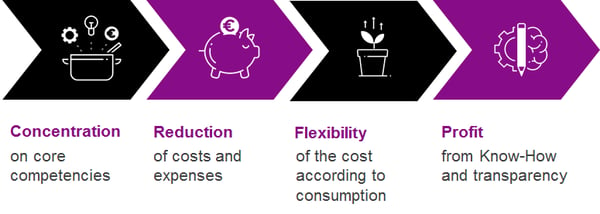
The term outsourcing is composed of the words outside, resource, and using. In an entrepreneurial context, this refers to the award of services that were previously provided within the company by its own means of production outward to external third parties. The goal: When a third part provider concentrates on its core competencies, such as production, and flanking activities, the process efficiency of your company's logistics increase.
Outsourcing has become increasingly important in recent decades. Depending a logistics provider's scope of services, different approaches can be distinguished. While the standard manufacturing company still largely realizes its own logistics in a 1PL approach (First Party Logistics Service Provider), an external service provider provides a 2PL (Second Party Logistics Service Provider) approach with transport, handling, or storage services. In a 3PL approach, the service provider supports its customers with services that go beyond traditional logistics activities - also known as value-added services. A 3PL provider takes assembly, quality control, packaging, continuous optimization measures, etc. This form of cooperation usually leads to long-term partnerships, the manufacturing company reduces its own logistics infrastructure, and the logistics service provider is deeply involved in processes and data flows. In a 4PL approach, the service provider also acts as a system integrator between the manufacturer and other logistics providers with the aim of improving coordination and organization of all business processes along the value chain. A 4PL provider takes on the optimization, integration, and control of the logistics chain and thus, the selection and commissioning of the required service providers.
Müller – Die lila Logistik has been implementing logistics services for its customers for three decades: from warehouse management and value-added services to the integration and optimization of holistic supply chain processes. We know exactly what opportunities lie within an outsourcing project:

To make your project a success, Lila Logistik supports you throughout the entire outsourcing project. The starting point is always our specially designed Make-or-Buy Analysis to evaluate whether outsourcing processes to an external service provider is profitable at all. Below, we have put together five tips from previous projects to help you successfully implement outsourcing into your operative business.
Five tips from practice for practice:

There is no universal answer to the question "Is outsourcing worthwhile?". But there are factors that support the success of a concrete outsourcing project. We'll happily talk to you about it.
Müller - Die lila Logistik SE
Ferdinand-Porsche-Str. 6
74354 Besigheim
Germany